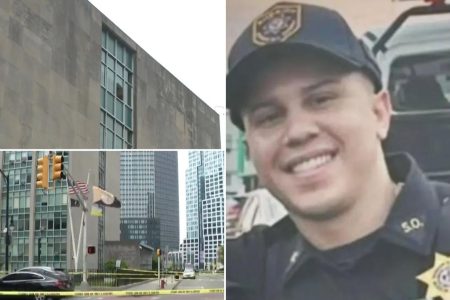Tom Homan, the incoming border czar appointed by President-elect Donald Trump, expressed optimism about New York City’s future safety following a productive meeting with Mayor Eric Adams. Homan lauded Adams for prioritizing public safety over politics in addressing the migrant crisis, a stance that sets him apart from other Democratic leaders who have embraced sanctuary city policies. The meeting, which lasted over an hour, focused on collaboration between the city and Immigration and Customs Enforcement (ICE) to address criminal activity and enhance public safety.
Adams expressed his willingness to assist ICE in apprehending criminal threats, national security risks, and locating missing children, many of whom are believed to be in New York City. This cooperative approach represents a significant shift from the city’s previous stance on immigration enforcement, which often hindered ICE’s ability to operate effectively within the city limits. Adams also expressed support for allowing ICE access to Rikers Island to detain dangerous individuals, preventing their release into the community. He advocated for a streamlined process where local law enforcement can transfer criminal aliens directly to ICE custody, further strengthening the partnership between the city and federal immigration authorities.
The mayor’s commitment to public safety extends beyond just cooperation with ICE. Adams vowed to utilize his executive powers to target individuals, regardless of their immigration status, who commit violent acts within the city. This stance reinforces the message that New York City will not be a safe haven for criminals, regardless of their origin. The meeting also touched upon the tragic murder of Laken Riley by an illegal immigrant with a prior criminal record in New York City. This case highlighted the potential consequences of lax immigration enforcement and underscored the importance of collaboration between local and federal authorities to prevent such tragedies.
Homan expressed hope that Adams’ proactive approach would inspire other mayors and governors grappling with the influx of migrants to prioritize public safety and reconsider their stance on sanctuary city policies. He specifically contrasted Adams’s approach with that of Chicago Mayor Brandon Johnson and Illinois Governor JB Pritzker, both of whom he criticized for their commitment to shielding migrants from deportation. Homan believes that Adams’s focus on public safety offers a model for other cities to emulate, demonstrating that it is possible to address the migrant crisis while simultaneously prioritizing the safety and well-being of residents.
The meeting between Homan and Adams marks a potential turning point in the city’s approach to immigration enforcement. The emphasis on collaboration between local and federal authorities, coupled with the mayor’s commitment to targeting dangerous individuals, signifies a move towards prioritizing public safety. This shift in policy may have ripple effects across the country, encouraging other cities and states to re-evaluate their approach to the migrant crisis and prioritize the safety of their communities. The follow-up between the two leaders’ staff will focus on the specifics of implementing these initiatives, laying the groundwork for a more effective and collaborative approach to immigration enforcement in New York City.
Homan’s confidence in Adams’s commitment to public safety underscores the potential for a positive change in the city’s approach to immigration enforcement. The collaboration between the city and ICE promises a more effective strategy for apprehending criminals, protecting vulnerable populations, and ensuring the safety of all residents, regardless of their immigration status. The meeting served as a strong signal of the incoming administration’s focus on border security and its willingness to work with local leaders who share a commitment to public safety. The anticipated “domino effect” of other cities following Adams’s lead could signify a nationwide shift towards a more balanced and effective approach to immigration enforcement.










